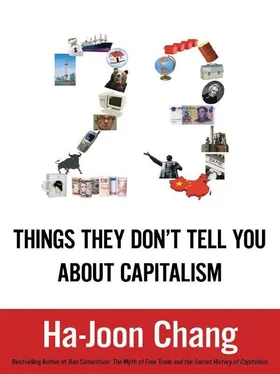Of course, in criticizing the inconsistency of free-market economists about immigration control, I am not arguing that immigration control should be abolished – I don’t need to do that because (as you may have noticed by now) I am not a free-market economist.
Countries have the right to decide how many immigrants they accept and in which parts of the labour market. All societies have limited capabilities to absorb immigrants, who often have very different cultural backgrounds, and it would be wrong to demand that a country goes over that limit. Too rapid an inflow of immigrants will not only lead to a sudden increase in competition for jobs but also stretch the physical and social infrastructures, such as housing and healthcare, and create tensions with the resident population. As important, if not as easily quantifiable, is the issue of national identity. It is a myth – a necessary myth, but a myth nonetheless – that nations have immutable national identities that cannot be, and should not be, changed. However, if there are too many immigrants coming in at the same time, the receiving society will have problems creating a new national identity, without which it may find it difficult to maintain social cohesion. This means that the speed and the scale of immigration need to be controlled.
This is not to say that the current immigration policies of the rich countries cannot be improved. While any society’s ability to absorb immigrants is limited, it is not as if the total population is fixed. Societies can decide to be more, or less, open to immigrants by adopting different social attitudes and policies towards immigration. Also in terms of the composition of the immigrants, most rich countries are accepting too many ‘wrong’ people from the point of view of the developing countries. Some countries practically sell their passports through schemes in which those who bring in more than a certain amount of ‘investment’ are admitted more or less immediately. This scheme only adds to the capital shortage that most developing countries are suffering from. The rich countries also contribute to the brain drain from developing countries by more willingly accepting people with higher skills. These are people who could have contributed more to the development of their own countries than unskilled immigrants, had they remained in their home countries.
Are poor countries poor because of their poor people?
Our story about the bus drivers not only exposes the myth that everyone is getting paid fairly, according to her own worth in a free market, but also provides us with an important insight into the cause of poverty in developing countries.
Many people think that poor countries are poor because of their poor people. Indeed, the rich people in poor countries typically blame their countries’ poverty on the ignorance, laziness and passivity of their poor. If only their fellow countrymen worked like the Japanese, kept time like the Germans and were inventive like the Americans – many of these people would tell you, if you would listen – their country would be a rich one.
Arithmetically speaking, it is true that poor people are the ones that pull down the average national income in poor countries. Little do the rich people in poor countries realize, however, that their countries are poor not because of their poor but because of themselves. To go back to our bus driver example, the primary reason why Sven is paid fifty times more than Ram is that he shares his labour market with other people who are way more than fifty times more productive than their Indian counterparts. Even if the average wage in Sweden is about fifty times higher than the average wage in India, most Swedes are certainly not fifty times more productive than their Indian counterparts. Many of them, including Sven, are probably less skilled. But there are some Swedes – those top managers, scientists and engineers in world-leading companies such as Ericsson, Saab and SKF – who are hundreds of times more productive than their Indian equivalents, so Sweden’s average national productivity ends up being in the region of fifty times that of India.
In other words, poor people from poor countries are usually able to hold their own against their counterparts in rich countries. It is the rich from the poor countries who cannot do that. It is their low relative productivity that makes their countries poor, so their usual diatribe that their countries are poor because of all those poor people is totally misplaced. Instead of blaming their own poor people for dragging the country down, the rich of the poor countries should ask themselves why they cannot pull the rest of their countries up as much as the rich of the rich countries do.
Finally, a word of warning to the rich of the rich countries, lest they become smug, hearing that their own poor are paid well only because of immigration control and their own high productivity.
Even in sectors where rich country individuals are genuinely more productive than their counterparts in poor countries, their productivity is in great part due to the system, rather than the individuals themselves. It is not simply, or even mainly, because they are cleverer and better educated that some people in rich countries are hundreds of times more productive than their counterparts in poor countries. They achieve this because they live in economies that have better technologies, better organized firms, better institutions and better physical infrastructure – all things that are in large part products of collective actions taken over generations ( see Things 15 and 17 ). Warren Buffet, the famous financier, put this point beautifully, when he said in a television interview in 1995: ‘I personally think that society is responsible for a very significant percentage of what I’ve earned. If you stick me down in the middle of Bangladesh or Peru or someplace, you’ll find out how much this talent is going to produce in the wrong kind of soil. I will be struggling thirty years later. I work in a market system that happens to reward what I do very well – disproportionately well.’
So we are actually back to where we started. What an individual is paid is not fully a reflection of her worth. Most people, in poor and rich countries, get paid what they do only because there is immigration control. Even those citizens of rich countries who cannot be easily replaced by immigrants, and thus may be said to be really being paid their worth (although they may not – see Thing 14 ), are as productive as they are only because of the socio-economic system they are operating in. It is not simply because of their individual brilliance and hard work that they are as productive as they are.
The widely accepted assertion that, only if you let markets be, will everyone be paid correctly and thus fairly, according to his worth, is a myth. Only when we part with this myth and grasp the political nature of the market and the collective nature of individual productivity will we be able to build a more just society in which historical legacies and collective actions, and not just individual talents and efforts, are properly taken into account in deciding how to reward people.
Thing 4: The washing machine has changed the world more than the Internet has
The recent revolution in communications technologies, represented by the internet, has fundamentally changed the way in which the world works. It has led to the ‘death of distance’. In the ‘borderless world’ thus created, old conventions about national economic interests and the role of national governments are invalid. This technological revolution defines the age we live in. Unless countries (or companies or, for that matter, individuals) change at corresponding speeds, they will be wiped out. We – as individuals, firms or nations – will have to become ever more flexible, which requires greater liberalization of markets.
Читать дальше






![Ally Carter - [Gallagher Girls 01] I'd Tell You I Love You But Then I'd Have to Kill You](/books/262179/ally-carter-gallagher-girls-01-i-d-tell-you-i-lo-thumb.webp)





